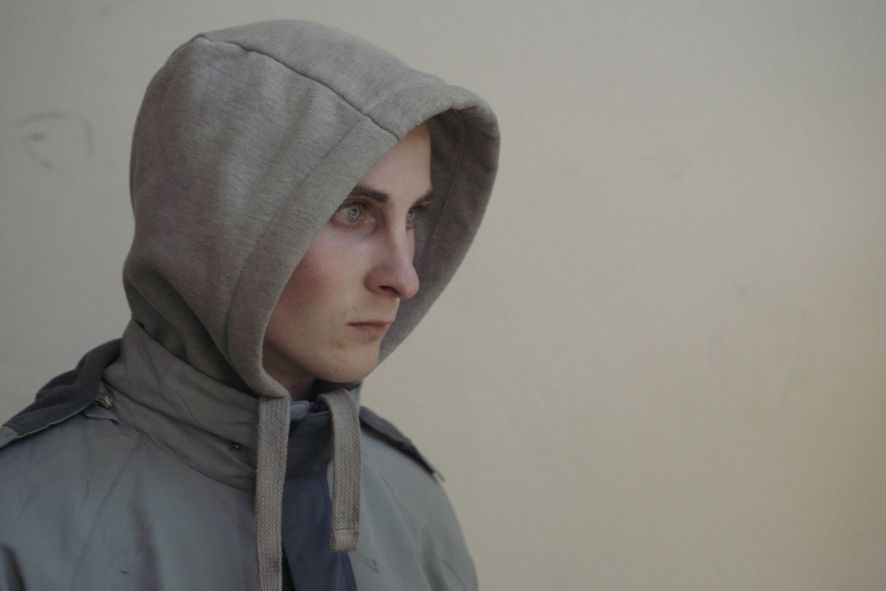Slovakia, , 2016
Mira
Fornay

Mira Fornay’s second full-length film, titled “Můj pes Killer” (My Dog Killer), is imbued with a heart-pounding intensity right from the very first scenes: the film starts off with a near-still life of an idyllic panorama of a Slovakian vineyard in the hazy light of dawn – only to be jarringly interrupted by an attack dog that grabs onto a piece of hanging rope and refuses to let go, ignoring pleas from his master, the young skinhead named Marek. The image and noise of the dog hanging on a rope are both absurd and nerve-wracking and yet, the scene offers the first inkling of the ongoing drama that plagues Marek’s existence.
The film follows the character for an entire day. Mira Fornay shows how Marek is torn between allegiance to his Neo-Nazi group and his troubled family, especially his younger half-brother Lukas, whose father is Roma. In a series of nonchalant, everyday cinematic gestures, Mira Fornay succeeds in capturing the discrimination and social exclusion that Roma and Sinti contend with in Slovakia. Marek and his friends are not demonized as the personification of evil – despite their sexist and racist language and behavior – because Mira Fornay eschews both a moralistic and heavy-handed pseudo-psychological interpretation of her characters.
When reviewing the film, critics from the American publications Hollywood Reporters and Variety didn’t know quite what to make of her elliptical narrative style, and especially its open-ended quality at critical moments in the narrative; on the other hand, in Anke Sternborg’s in Süddeutsche Zeitung, she writes that, “Mira Fornay portrays Slovakia during a time of upheaval with a sparse realism, brought to life with her amateur actors,” (3.20.14), while the online magazine NEGATIV offered the following words of praise: “MY DOG KILLER is an example of uncompromising art that aims to foster awareness and dialogue. It is an example of necessary art that does not shut its eyes. The same thing can be said about its creator Mira Fornay, who never hesitates to speak out. After considerable experience with short films, this is only Fornay’s second feature film. And she still has a lot to say,” (Dennis Vetter, 4.4.14).
Political events also implicitly shaped the story of Fornay’s film “Lištičky,” which portrays two sisters from Slovakia who strike out and try their luck in Ireland. Here, Mira Fornay shifts her style from documentary realism to a more poetic form of realism: For example, the main character begins to lead a secret double life, while the titular foxes symbolize the shadowy existence experienced by many immigrants. As the director explains, “Foxes have lived in Dublin for almost a century, and yet people still consider them to be alien creatures – just as many of us perceive the immigrants who live among us. Immigrants are like urban foxes – they can survive on scraps.”
In her films, Mira Fornay pays close attention to her protagonists’ closest personal relationships. This way, she provides subtle, precise documentation of society’s central problems, which are often politicized into simplistic wedge issues – such as right-wing radicalism in “Můj pes Killer,” or the issue of economic migrants in “Lištičky.” She accomplishes this through her masterful direction of amateur actors as well as through careful research and observation. Her narratives gain a documentary quality through the use of hand-held cameras, the lack of background music, and the way her story appears to unfold in real time. In short, she always trains her gaze on the everyday lives of her characters.
The high quality of her films has been recognized with a number of important awards. For example, her second full-length feature film, “Můj pes Killer” (My Dog Killer), won the prestigious “Tiger” award at the Rotterdam Film Festival in 2013 and was also invited to over forty film festivals around the world. It won the CineVision award at the Munich Film Festival and the prize for best direction in Vilnius. Her debut film “Lištičky” (Foxes) premiered in 2009 at the Venice Film Festival and was screened at the most important international film festivals.
Mira Fornay was born in 1977 in the then-ČSSR. As the daughter of a cinematographer, she always wanted to become a filmmaker. She studied directing at the FAMU in Prague and at the National Film School in Great Britain. To date, she has created two feature films and 13 short films. For her films, she oversees not only direction, but she also serves as co-producer and writes the screenplays. Her most recent short film, titled “Gardeners,” was shown at the International Film Festival in Rotterdam in 2016.
In Berlin, she plans to continue work on the screenplay for her third feature film “Cook, F**k, Kill” (Frogs with No-Tongues), which already received the main award for new projects at Sofia Meetings in 2014. The film will be produced by Marianne Slot from Slot Machine, who co-produces films directed by Lars von Trier. The film is about domestic violence, but uses a video game-like structure. Thanks to the device of virtual reality, Fornay allows her story to unfold with three different plots, while her main character switches gender at the flick of a switch.
Text: Maike Wetzel
Translation: Amy Pradell
2013 Můj pes Killer (My Dog Killer/feature film, 35 mm, 90´)
2009 Lištičky (Foxes/feature film, 35 mm, 83`)
2004 Alzbeta (Short film, Mini DV, 18´)
2002 Small Untold Secrets (Short film, 35 mm, 22´)


